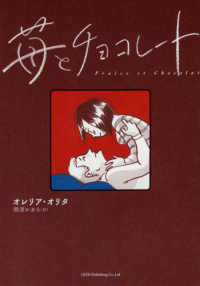- ホーム
- > 洋書
- > 英文書
- > Literature / Classics
基本説明
Traces literary intimacy between the U.S. and East Asia that spans the twentieth century. Commercial and political bridges generated transpacific literary alliances, and Park analyzes American bards who capitalized on these ties and interrogates the price of such intimacies in the work of Asian American poets.
Full Description
Walt Whitman called the Orient 'The Past! the Past! the Past!' but East Asia was remarkably present for the United States in the tewentieth century. Apparitions of Asia reads American literary expressions of a century of U.S. - East Asian alliances in which the Far East is imagined as near and contemporary. Commercial and political bridges across the Pacific generated American literary fantasies of ethical and spiritual accord; Apparitions of Asiaexamines American bards who capitalized on these ties and interrogates the price od such intimacies for Asian American poets. Park begins her literary history with the poetry of Earnest Fenollosa, who called for'The Future Union of East and West'. From this prime instigator of the Gilded Age, she newly consideres the Orient of Ezra Pound, who turned to China to lay the groundwork for his poetics and ethics. Park argues that Pound's Orient was bound to his America, and she traces this American- East Asian nexus into the work of Gary Snyder, who found a native American spirituality in Zen. The second half of Apparitions of Asia considers the creation od Asian America against the backdrop of trans-Pacific alliances. Park analyzes the burden of American Orientalism for Asian American poetry, and she reads the innovations of Lawson Fusao Inada as a critique of this literary past. Apparitions of Asia concludes byconsidering two Asian American poets, Theresa Hak Kyung Cha and Myung Mi Kim, who return to modernist forms in order to reveal a history of American interventions in East Asia.
Contents
Introduction1: Cathay to Confucius: Ezra Pound and China2: Beatific Orientalism: Gary Snyder and Zen3: Beats and Bandits: Lawson Fusao Inada and the Asian American Movement4: Modern Warfare: Theresa Hak Kyung Cha and Myung Mi KimConclusionNotesBibliographyIndex








